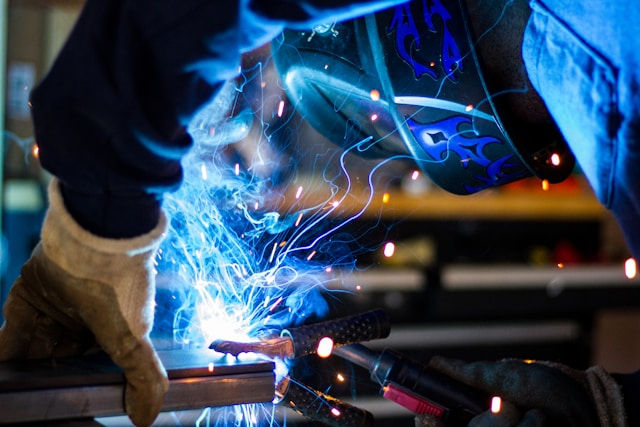Six ways to optimize energy consumption in Manufacturing
- Team Syook

- Mar 20, 2024
- 4 min read
Updated: May 30, 2024
Maximize manufacturing efficiency while minimizing energy consumption in manufacturing through practical strategies and initiatives, enhancing sustainability goals and reducing costs.

In an era where sustainable development is at the forefront of global concerns, the imperative to enhance energy efficiency and embrace effective energy-saving practices have garnered unprecedented attention. This focus isn't just a matter of environmental consciousness; it's a strategic necessity for manufacturing industries worldwide. Among these, manufacturing stands out as a pivotal player, bearing the dual roles of both the largest energy consumer and a prime target for optimization efforts.
In this blog, we discuss a few approaches and strategies manufacturing companies can implement to reduce energy costs, as well as enhance sustainability goals.
Navigating energy consumption in manufacturing optimization challenges
As governments tighten regulations and competitors intensify their efforts, manufacturing industries find themselves at a crossroads, compelled to evolve towards energy optimization. Within this landscape, the optimization of energy consumption in manufacturing operations emerges as a linchpin for sustainable progress.
At the heart of this endeavor lies the realm of operation and maintenance (O&M) of manufacturing systems—an area brimming with potential for energy optimization. Yet, this journey towards energy efficiency is fraught with challenges.
The dynamic nature of manufacturing activities, the intricacies of system structures, and the ambiguity surrounding energy optimization definitions pose formidable obstacles. Most companies today are lacking an effective strategy to manage their energy consumption and keep costs under control.
Maximizing energy efficiency in manufacturing shop floors
In the dynamic environment of manufacturing shop floors, optimizing energy
usage stands as a pivotal strategy for cost reduction and environmental sustainability. To achieve this, active measures need to be implemented throughout operations.
Here are several actionable tips to empower manufacturing facilities in minimizing energy consumption and maximizing productivity:
Energize with Audits: The journey towards energy efficiency begins with a comprehensive energy audit. By analyzing your energy usage patterns and identifying areas of inefficiency, you can lay the groundwork for targeted energy-saving solutions. With the help of professional energy auditors, you'll gain valuable insights that will set you on the path to success.
Upgrade to Efficiency: Outdated machinery can be a drain on your resources. By investing in energy-efficient equipment, you can significantly reduce your energy costs and improve your bottom line. Whether it's upgrading motors or embracing advanced technologies like variable speed drives, the benefits are undeniable.
Get Smart with Manufacturing: In the era of intelligent manufacturing, data is king. By implementing sensors, controls, and monitoring systems, you can optimize energy consumption in real-time and make informed decisions that drive efficiency. Learn from industry leaders who are leveraging innovative technologies to trim waste and boost productivity.
Streamline for Success: Streamlining your production processes is key to minimizing energy waste and maximizing efficiency. By identifying bottlenecks and eliminating unnecessary steps, you can streamline your operations and improve your overall productivity. Lean manufacturing principles can help you reduce waste and optimize energy usage, putting you on the path to success.
Power Up with Renewables: Break free from traditional energy sources and embrace renewables. Whether it's solar, wind, or geothermal energy, renewable sources offer a sustainable alternative to traditional fossil fuels. While the initial investment may seem daunting, the long-term benefits are undeniable—and the positive impact on the environment is priceless.
Cultivate a Culture of Savings: Energy efficiency isn't just about technology—it's about people too. By fostering a culture of energy savings within your organization, you can empower your employees to make a difference. Encourage idea sharing, implement KPIs, and celebrate success stories that demonstrate your commitment to sustainability.
How IoT helps in reducing energy consumption in Manufacturing?
Industrial robots have become commonplace on the factory floor thanks to their accuracy, precision, endurance and speed. Now, manufacturers can extend the impact of industrial robots by connecting them to IoT devices.
Connected manufacturing IoT sensors enable machines to communicate with each other, share data, and coordinate their activities autonomously. By sharing data between machines, IoT devices improve robotic efficiency and productivity while also improving safety and reducing unscheduled maintenance.
When it comes to energy and sustainability, The use of IoT in manufacturing can reduce energy usage. For example, a manufacturer found that real-time IoT monitoring of the production line helped reduce the energy costs of machinery by almost 40%.
Other key impacts of IoT in manufacturing are as follows:
Efficiency and productivity: According to a report by McKinsey, IoT applications in manufacturing have the potential to create an economic impact of $1.2 to $3.7 trillion per year by 2025.
Predictive maintenance: Research by Deloitte indicates that predictive maintenance enabled by IoT technologies can reduce equipment breakdowns by 70% and decrease maintenance costs by 25%.
Supply chain optimization: Today, 78% of supply chain leaders are seeking technology solutions to increase operational efficiency, improve production and delivery speeds, and automate repetitive tasks.
Innovating Energy Solutions for a Sustainable Future
Optimizing energy usage on manufacturing shop floors demands an active approach that encompasses equipment upgrades, process optimization, employee engagement, and the adoption of energy management systems.
By implementing these proactive measures and fostering a culture of energy conservation, manufacturing facilities can slash operational costs, boost competitiveness, and contribute to a greener future.
In today's fast-paced industrial landscape, energy efficiency isn't just a buzzword—it's a strategic imperative. With rising energy costs and growing environmental concerns, the time has come for manufacturers to rethink their energy strategies and embrace innovation like never before.
Are you ready to transform your manufacturing operations? Take the next leap forward and lead the charge toward a more sustainable future.




QuickBooks Integration by QBIS
Seamlessly sync orders, invoices and payments with QuickBooks Online and Desktop using QBIS. Automate accounting and save hours every month. Try QBIS now!